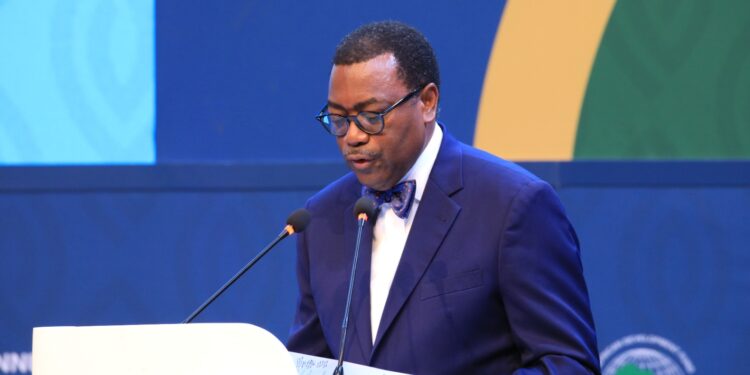The African Development Bank (AfDB) Group is implementing a $6 billion investment plan to transform Africa’s healthcare landscape and strengthen health systems across the continent.
The initiative consists of two major programmes: a $3 billion programme focused on developing quality health infrastructure, and another $3 billion programme dedicated to building local pharmaceutical manufacturing capacity in Africa.
Dr. Akinwunmi Adesina, President of the AfDB, announced the creation of the African Pharmaceutical Technology Foundation while presenting his 10-year scorecard at the ongoing 2025 Annual Meetings of the Bank in Abidjan.
He noted, “Today, the African Development Bank Group is implementing a $3 billion programme for quality health infrastructure and a $3 billion programme for the development of local pharmaceutical manufacturing capacity in Africa.”
Dr Adesina said this culminated with the creation of a new institution, the African Pharmaceutical Technology Foundation, to enable Africa to gain access to intellectual property rights and to protect technologies and processes for manufacturing medicines and vaccines.
AfDB’s agricultural impact: 104 million achieve food security
On agriculture, the AfDB president said that the Bank was supporting the sector in Africa and had increased the continent’s capacity to feed itself.
According to him, in ten years, our work allowed 104 million Africans to achieve food security as well as provide 13 million farmers with access to improved agricultural technologies.
“I see the impact of our work in supporting Africa to avoid a looming food crisis predicted when the war of Russia in Ukraine broke out.
“The news headlines were awash with predictions of food crisis in Africa, as the continent would lose 30 million tons of food (wheat, maize and oilseeds) imported from Russia and Ukraine.
“The African Development Bank swung into action with its 1.5 billion dollars emergency food production facility. Our Feed Africa plan worked,’ Adesina said.
Farm support yields 44 million tons of food in two years
The AfDB president said in just two years, our support had allowed 14 million farmers across 30 countries to have access to improved seeds and fertilizers.
This, he noted, led to the production of 44 million tons of food (116% above the target) worth 17.3 billion dollars.
“Thanks to the Bank’s support, Ethiopia increased its agricultural areas producing heat-tolerant wheat varieties from 5,000 hectares when we started in 2018, to over 650,000 hectares by 2023, allowing the country to become self-sufficient in wheat within four years.’’
Feed Africa summit mobilizes $72 billion for food security
Adesina said that the landmark Feed Africa Summit, which held in Dakar, brought together more than 30 Heads of States and Governments, who signed the Food and Agriculture Delivery Compacts to accelerate food production and food sovereignty in their countries.
He said that the summit was approved unanimously by the African Union, adding that 72 billion dollars was mobilized globally for Africa’s food security.
“The inspiration of the Feed Africa Summit informed our next bold action to achieve universal access to electricity in Africa.
“To fast-track access to electricity, the African Development Bank and the World Bank jointly inaugurated the Mission 300 in Dar Es Salaam, to connect 300 million people in Africa to electricity by 2030.
“At the Africa Energy Summit in January this year, we organized, hosted and co-chaired, along with President Samia Suluhu Hassan, a historic gathering of more than 48 African countries.
“Leaders at the summit unanimously endorsed the Dar es Salaam Declaration on Energy Access, with the full support of the African Union,’’ Adesina said.
According to him, the Declaration marks an unprecedented continental commitment to accelerate energy access through coordinated national actions, regional interconnections, and enhanced investment in renewables and grid expansion.
The AfDB president said about 55 billion dollars was mobilised in support of these national energy compacts.















